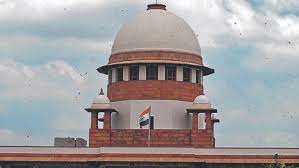The Trial Court sentenced the respondent–accused to undergo imprisonment for life (for the remainder of natural life). (Para 4)
In the appeal preferred by the respondent–accused, while confirming the conviction, the High Court showed leniency by reducing the sentence for the offence under clauses (i) and (m) of subsection (2) of Section 376 of IPC to rigorous imprisonment for twelve years. (Para 5)
The reasons given by the High Court for showing leniency are:
a. The age of the respondent–accused was twenty-two years;
b. The respondent–accused belonged to a poor scheduled caste family;
c. The respondent–accused is not a habitual offender and
d. The respondent–accused has been suffering incarceration since 8th May 2014. (Para 10)
While dealing with the issue of sentence, in such a case, the mitigating circumstances which weigh in favour of the accused must be balanced with the impact of the offence on the victim, her family and society in general. The rights of the accused must be balanced with the effect of the crime on the victim and her family. This is a case which impacts the society. If undue leniency is shown to the respondent in the facts of the case, it will undermine the common man’s confidence in the justice delivery system. The punishment must be commensurate with the gravity of the offence. When it comes to sentencing, the Court is not only concerned with the accused but the crime as well. (Para 12)
Only two factors prevent us from restoring the life sentence. First is the young age of the accused. His age was 22 years, as noted by the High Court. The second is that he has undergone the sentence imposed by the High Court. Therefore, we are of the view that in this case, the sentence of rigorous imprisonment of fourteen years will be appropriate. However, while he undergoes the remaining sentence, the respondent shall not be entitled to remission. Under subsection (2) of Section 376 of IPC, the offence is also punishable with a fine. The Trial Court had imposed a fine of Rs.25,000/. It is not clear whether the said amount of fine has been paid. We maintain the sentence in default of payment of the fine amount, which is six months imprisonment. We retain the punishment for the other offences and the sentence in default of fine. We also propose that after retaining a sum of Rs.5,000/for the State, the rest of the fine amount shall be paid over to the victim as compensation. (Para 13)
We partly allow the appeal by passing the following order:
a. The respondent–accused is sentenced to suffer rigorous imprisonment for fourteen years for the offences punishable under clauses (i) and (m) of subsection (2) of Section 376 of IPC;
b. The respondent-accused shall not be entitled to remission while undergoing the enhanced sentence. The remission granted earlier will remain unaffected;
c. The substantive sentence for the rest of the offences is maintained;
d. The direction of the Trial Court, as regards the sentence to be undergone in default of payment of fine, is maintained;
e. If the respondent–accused has already paid the fine amount payable under the judgment of the Trial Court while retaining the sum of Rs.5,000/for the State, the rest of the amount shall be paid over to the victim as compensation;
f. We direct the Secretary of the Rajasthan State Legal Services Authority to ensure that compensation under the relevant victim compensation scheme is immediately paid to the victim as per her entitlement, if not already paid;
g. If the respondent has already been released after undergoing the punishment in terms of the verdict of the High Court, he shall be forthwith arrested and sent to prison for undergoing the remaining sentence in terms of this judgment; and
h. The Registry is directed to forward a copy of this judgment to the Secretary of the Ministry of Women and Child Development of the Central Government to enable the Government to take appropriate action in terms of paragraph 16 above. (Para 18)
SUPREME COURT OF INDIA
2023 STPL(Web) 336 SC
[2023 INSC 903]
State Of Rajasthan Vs. Gautam S/O Mohanlal
Criminal Appeal No. 3168 of 2023 (Arising out of Special Leave Petition (Crl.) No.11331 of 2019)-Decided on 11-10-2023
https://stpllaw.in/wp-content/uploads/2023/10/2023-STPLWeb-336-SC.pdf







